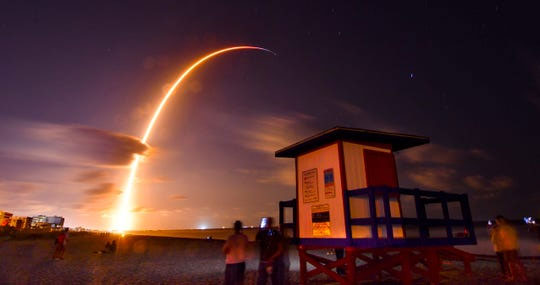New space race: Bringing the Internet to the most remote places
According to USA Today, like the race to win the throne in the universe in the 20th century after the Soviet Union launched Sputnik 1 satellite, this race is also related to satellites.
More than a dozen companies have asked US regulators to allow the exploitation of thousands of satellites providing Internet services. Not all satellites connect consumers to the Internet. Some have global ambitions. Jeff Bezos, founder of Amazon, said at a conference in June: 'The goal here is to have broadband everywhere'.

SpaceX's Falcon 9 rocket carrying 60 Starlink broadband network satellites takes off from Florida.(Photo: AP).
When half of the world's population (over 3 billion people) does not use the Internet, the market potential is huge. Without access to the Internet, many people in remote areas face difficulties in life: cannot apply for jobs, study, use health services or participate in the global economy.
However, the Internet wave transmitted from space encountered many obstacles. Launching satellites is expensive, technically complex, and therefore Internet service is too expensive for the affordability of the companies that companies want to serve. Cosmic waste arising is also a matter to be considered.
Some companies, such as HughesNet and Viasat, have provided satellite Internet services, but the service is expensive and limited, the quality is also flickering and does not have many users. Newer satellites are smaller, cheaper, closer to Earth, so they theoretically transmit signals faster, making applications work better.
In the race, there are big names like Amazon, SpaceX and more recently OneWeb. However, according to Kerri Cahoy, Professor of Aeronautics and Astronomy at the Massachusetts Institute of Technology, the industry is in its infancy and will take at least three more years to provide a wide range of commercial services. Companies will have to take even more time to make money from satellite Internet.
Currently, there are many competing efforts in Internet services. Google provides the internet with hot air balloon Loon, some companies provide Internet via drone .

Satellite of Viasat company.(Photo: Viasat).
Meanwhile, satellite companies need to build pan and conventional antennas more complex, more expensive than traditional satellites. Space X has asked for permission to build 1 million earth stations to help connect customers to the Internet. However, if the costs of these devices are not reduced, the network service is unlikely to be cheap.
Becoming an Internet service provider is not easy. Satellite Internet companies often collaborate with telcos to sell Internet services directly because it is easier than marketing and selling goods themselves. Telecommunications companies themselves do not want to build systems in remote areas because they are too expensive.
An official of the US Federal Communications Commission in 2017 estimated that it would cost US $ 90 billion to open Internet services to 20 million US homes and businesses without broadband. In developing countries, due to inferior infrastructure, the Internet is mostly available on mobile phones.
In that context, new satellite companies may have cheaper alternatives for infrastructure. Normally, telecommunication companies have to pay to build a system to serve a small number of customers in a large area, so the cost per customer is very large. With satellites, this cost will decrease as more potential customers around the world use the service.
However, the Internet infrastructure is only one step to attract customers to use the service. Customers also need to be able to pay for Internet services, while those in rural areas are often poor. It is unclear what the price of satellite Internet services will be, but 20 years ago, satellite phone services also struggled to survive because of high prices. This situation can occur with satellite Internet.
Martin Schaaper, an analyst at the United Nations Information and Communications Technology, said: 'If you have to pay from 20% of your income to connect to the Internet when you only earn a few dollars a day, people won't use the internet because it's so expensive '.
- The Internet playground is hard to have places for ISPs to come later
- The ambition of 'space cowboy'
- Low-cost satellite Internet for the poor
- China is about to transmit Internet super security from space
- VNREDSat-1 satellite leaves the launch pad successfully
- Iran successfully put the second monkey into space
- Russia is afraid to lag behind in the race to space
- VNREDSat-1 satellite images fly into space
- Cheap space service
- Improved wi-fi wave with sheep
- US - China 'arms race' on the internet
- The most remote places in the world are inhabited
 Van Allen's belt and evidence that the Apollo 11 mission to the Moon was myth
Van Allen's belt and evidence that the Apollo 11 mission to the Moon was myth The levels of civilization in the universe (Kardashev scale)
The levels of civilization in the universe (Kardashev scale) Today Mars, the sun and the Earth are aligned
Today Mars, the sun and the Earth are aligned The Amazon owner announced a secret plan to build a space base for thousands of people
The Amazon owner announced a secret plan to build a space base for thousands of people